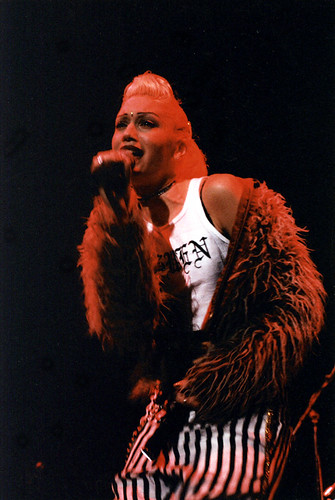“Just A Girl”: No Doubt’s Powerfully Relevant Hit
No Doubt, Gwen Stefani’s band that originally shot her to stardom, produced a number of hits in the 90s and early 2000s. Their most relevant song today still rings true of women’s modern struggle with cultural identity, self-acceptance, and social equality.

Gwen Stefani, lead singer of No Doubt, croons into a microphone during a concert with her band. No Doubt has been ingrained in the image of the ’90s, but still finds a foothold in modern day culture with their classic song, “Just A Girl”, identifying the struggles that women face on the daily. “Gwen1” by Kris Sikes is licensed under CC BY-NC-SA 2.0.
October 20, 2019
As a hit band of the ‘90s, No Doubt has become a legend of the era. But its musical relevance remains overarching in its importance in today’s modern world. Music’s application can be limited to the time it was born in, but in other cases, it withstands the ever-changing tides of civic social culture.
“Just A Girl”, one such case, is a potent piece that challenges power dynamics between a woman and her place in our society’s hierarchy. Strong electric guitar and deep bass provide the foundation for a politically charged piece that brings the words “powerhouse” and “oppression” to mind.
The piece seems to be just a simple accompaniment to “Don’t Speak”, another hit song on the album “The Tragic Kingdom” (released in 1995), but it opens with a sharp riff that snags the listener’s attention. Stefani leads with soft words that hit hard. “Take this pink ribbon off my eyes/ I’m exposed and it’s no big surprise/ Don’t you think I know exactly where I stand? This world is forcing me to hold your hand.” It would appear, in Stefani’s soothing yet piercing song speak, that the soft playthings and expected hair adornments of femininity are used to blind women to their objectification. In 1995, this had truth in the struggle women faced with sexist patriarchal ideals, but as a song still relevant today, these lines exert authoritative influence as movements like #MeToo and #IBelieveHer have reached the peak of their social target and women are finding themselves in a perpetual political backslide with the passing of Southern abortion “heartbeat” bans. Women are empowered now to come forth and there is no doubt that “Just A Girl” was a foundational inspiration to a revolution that has set fire to the nation.
The song’s salient sounds include a broad electric guitar, manipulative skid tracks, and a fast-paced drum beat, which culminates into a chorus that sounds craftily woven together and creates harmony to a listener in the musicality while also introducing chaos in the actual instrumental portion. As a whole, the piece is brisk and if you don’t pay attention, you could miss the gut-wrenching message Stefani embued with her entire soul, which in itself is the power of the song. If a listener is simply listening and not completely hearing, “Just A Girl” sounds like another successful hit to be played on the radio a few times and then shut away in the mental archives that all collectors of music inevitably have, a dusty bookmark of teenage rebellion to be shrugged at. Ironic, isn’t it? The very nature of the song is so chaotic that the instrumental and vocal portions compete for total and absolute attention when the truth of the message, the heart of the song, lays in the listener’s hands, a listener bound to cave in to the head-bobbing beat and shrieky guitar before ever really giving credence to the evident struggle of Stefani and through her, millions of other women.
“I can’t do the little things I hold so dear ‘cause it’s all those little things I fear,” cries Stefani, mirroring a sense of terror nowadays when sexual, physical, and mental violence against women is at an all-time high. The song shifts between anger, bitterness, dejection, and a melancholy tone so fluidly, it perpetuates an emotional tornado that leaves the listener still thinking about the song, mouthing its lyrics as they exchange it for the sound of catcalling in their workplace, hurried steps across a dark parking lot at dusk, the terrified murmurings of fingers clutched around car keys.
Stefani’s reverberating libretto that produces heavy emphasis on an often silenced or mocked protest is vital in contemporary culture, not merely left to be just an echo of an era where low-rise jeans, thinly penciled eyebrows and shuttered abuse were the social norm.



